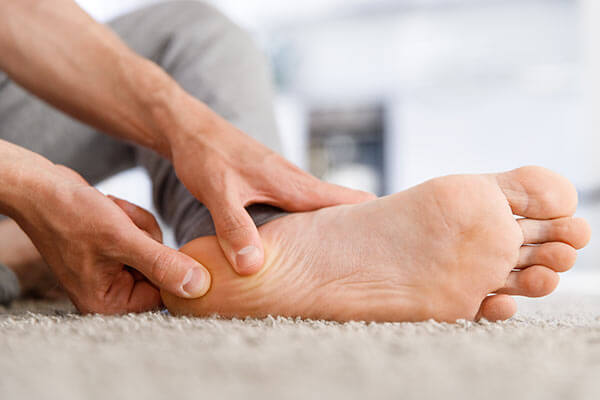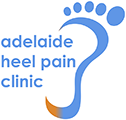Plantar Fasciitis Treatment Glenside
Is persistent heel pain interfering with your daily routine, exercise, or work? Plantar fasciitis might be the reason.


What is Plantar Fasciitis?
The plantar fascia is a thick band of tissue that stretches along the bottom of your foot, from the heel to the toes. It supports the arch of your foot and plays a vital role in comfortable movement. Plantar fasciitis occurs when this tissue becomes inflamed, often leading to severe heel pain.
At the Adelaide Heel Pain Clinics near Glenside, heel pain is the most frequently seen condition, with approximately 50 cases of plantar fasciitis treated each day. Although common, this condition requires immediate attention. Research shows that 50% of those affected still experience symptoms after five years, and 45% continue to suffer after ten years. Early intervention from a podiatrist is vital to prevent years of ongoing pain.
Symptoms of Plantar Fasciitis
Plantar fasciitis is commonly marked by sharp heel pain that typically occurs on the bottom of the foot near the heel. This pain often worsens after long periods of rest, like sleeping or sitting for extended durations. Other signs can include swelling, tenderness, limping, and pain spreading across the sole of the foot.


What Causes Plantar Fasciitis
Plantar fasciitis arises from strain and pressure on the plantar fascia, leading to inflammation and resulting in heel pain. High-impact activities like running, dancing, or gymnastics often trigger this condition. Risk factors also include weight gain, age, pregnancy, long hours on your feet, and structural foot issues like flat feet or high arches.

Ultimate 7 Step Checklist to Heal Your Morning Heel Pain
Tired of Limping?
Book an Appointment to Treat Your Heel Pain Today!
Treatment of Plantar Fasciitis
Every day, the Adelaide Heel Pain Clinics manage numerous cases of plantar fasciitis. Our extensive experience and resources enable us to treat heel pain effectively, no matter the severity or specific needs of each patient. With various treatment options available, we’re committed to building a tailored plan that works for you.
Adelaide Heel Pain Clinic delivers trusted plantar fasciitis treatment to residents across North Adelaide, Eastwood, Parkside, Glenside, Frewville, Fullarton, Highgate, Myrtle Bank, Brompton, Prospect, Walkerville, Unley, St Peters, Norwood, Thebarton, Mile End, Glenunga and surrounding suburbs.

Radial Shockwave Therapy
With no lasting side effects and no recovery time needed, radial shockwave therapy is a highly effective treatment choice. We regularly offer this therapy to assist patients dealing with different forms of heel pain.

Focal Shockwave Therapy
Focal shockwave therapy machines are rare in Australia, and our clinic proudly houses the only one in South Australia. This state-of-the-art treatment provides one of the most effective methods for relieving heel pain.

Dry Needling
One of the most effective methods for relieving tight muscles is dry needling. This technique uses fine acupuncture needles to release trigger points and reduce muscle pain.

Orthotics
Custom orthotics offer tailored comfort and support, fitting seamlessly into any shoe you choose to wear. They provide a treatment solution built around your foot’s specific requirements.

Low-Level Cold Laser
Low-level cold lasers offer a less painful alternative to traditional hot lasers. As a breakthrough technology in podiatry, this treatment could be the ideal solution for your needs.

Exercise Rehabilitation
A treatment plan customised to your pain, health, and goals could be just what you need. Working with a podiatrist on an individualised exercise rehabilitation program offers numerous benefits.
Your Top Plantar Fasciitis Questions Answered
Is there a difference between plantar fasciitis and heel spurs?
No, they’re not the same. Although they share similar symptoms, plantar fasciitis is caused by inflammation of the ligament, while heel spurs are bony growths that develop on the heel bone.
What are the most supportive shoes for plantar fasciitis?
The best shoes for plantar fasciitis depend on your daily activities and specific foot requirements. There’s no universal solution, so it’s important to work with a podiatrist to find the right support for your needs.
Should I avoid walking or running with plantar fasciitis?
Taking time off from high-impact exercises like running is crucial for proper plantar fascia recovery. Nevertheless, maintaining physical activity is important—try low-impact exercises such as swimming to avoid worsening your heel pain.
Can plantar fasciitis run in families?
No, plantar fasciitis isn’t hereditary. There’s no evidence of a genetic connection, meaning it isn’t passed down from your parents.
How can I tell if I have plantar fasciitis?
Plantar fasciitis pain is typically described as a sharp, stabbing sensation near the heel, affecting the bottom of the foot. It’s usually most severe with the first steps after getting up in the morning or following prolonged sitting or standing.
When is it time to see a podiatrist for plantar fasciitis?
It’s important not to ignore heel pain. If you’re experiencing any symptoms, seeing a podiatrist as soon as possible is the best course of action.
Do compression socks help manage plantar fasciitis symptoms?
Yes, compression socks offer support for the arches and ankles, improving alignment and limiting mobility, making them helpful for plantar fasciitis. For the best results, discuss your symptoms with a podiatrist for individualised care.
Why is plantar fasciitis pain worse in the morning?
The plantar fascia shortens during long periods of inactivity, such as sleeping or sitting for extended periods. When you start moving again, stretching the tightened tissue can lead to increased pain, especially in the morning.

Book Online in less than 60 Seconds
Join over 20,000 South Australians who are now pain free!
